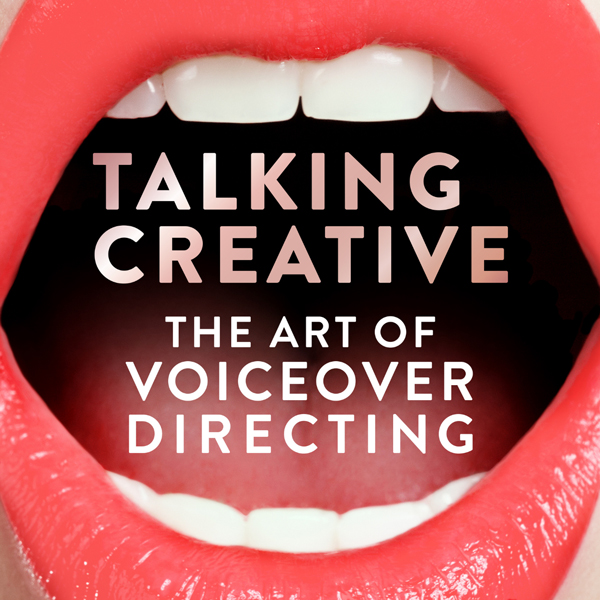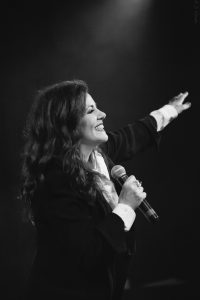Back in the booth for another podcast

Having appeared on the VO Boss podcast in 2018, I was recently asked to be a guest on Samantha Boffin’s podcast, Talking Creative – the Art of Voiceover Directing.
The podcast is aimed at helping clients, creatives, producers – and indeed, anyone working with professional voice-over artists – find, brief and direct their chosen VO, so that they get a great read and a fantastic result.
A while ago, Samantha was one of my voice coaching students – and today she appears on my Rich List of professional voice-over artists, whom I heartily recommend.
You can listen to our interview here.
But if you’d prefer to have a quick read of the main points, here’s a slightly cut-down text version. Happy reading!
Talking Creative interview with Tanya Rich
How did you get started as a professional voice-over?
 I was very lucky, actually. I took myself off – on the advice of my mother who had done voiceover when commercial radio first started – to my local radio station Signal in Stoke-on-Trent and said, “Can I have an audition to be a voiceover please?”
I was very lucky, actually. I took myself off – on the advice of my mother who had done voiceover when commercial radio first started – to my local radio station Signal in Stoke-on-Trent and said, “Can I have an audition to be a voiceover please?”
And a guy emerged and it was the writer Les Scott, who knew me when I’d managed the punk band Discharge. And he said, “Hello Tanya, what are you doing?” I said, “Well, you know, my mum thinks I should be voiceover. What do you reckon?” And he said, “Come on through do an audition, meet Les Woollam, the producer”. So Les was very kind of sombre compared to Les. “This is Tanya, she’ll be great”. “Have you ever done this before? No. But I’ve done loads of drama, and I am a professional session singer.”
They sat me down, gave me a script. I read it. And they said, ”You’ve done this before -you’re a hustler.” I said, “No, no, I haven’t.” They said, “Well, that was bang on 30 seconds. Let’s give her a harder one”. So they gave me 20 seconds – I did that. Now obviously, the VO style wasn’t perfect, but they saw enough in me. And the greatest thing of all was, I got trained on the job. They had a female voice that they use regularly. And I spent two years being the second voice.
Can you explain the second voice?

I’d just be the voice echoing back. So for example, I’d go “new kitchen, Sam?” and she’d go, “Yes, that’s right. I got it from blah, blah, kitchens”. Then I’d go, “Wow, that’s great. What was that number?”
So that was going up and down the country?
That was just in Stoke-on-Trent. And then what happened was, after two years doing that, I got enough stuff together to make a reel and I send it off to JMS and Harewood radio, who then took me under their respective wings and taught me even more about being a VO. And from there, I got more reels, sent them off. And that’s when the real fabulous time of being a jobbing VO was because that’s when we got our bookings a year in advance and drove around the country and worked with everybody and did everything and anything.
That’s how you really learned how to be the voice that you are now?
Yes, absolutely. When you got to a station, you didn’t know what to expect. So you could have had 10 scripts, or you could have had 50 scripts. And you had to literally go from hard sell soft sell – mother, grandma, child, witch, fairy – you never knew. And you were expected to do it quickly. Because of course, in those days, it was all done to tape. It had to be cut with a razor blade, you know, which is why we all have this fantastic breathing method. We all know intonation, and we can all voice to time.
Was it helpful that you were a singer as well?

Yes, I think so. Because if you can hear the music and the copy, that really does help because it is a rhythm. There are rhythms in copy. That’s why you know, thinking about real inflection and how we actually bring things to life is really important. Yeah.
Did you spend a long time working that circuit?
I did. That’s why I know all the cracking old-school voices. And when I say old-school, I don’t mean their voice age, I mean them as in their values and their skill set. We had to deliver. Whatever we felt like, we always had to be fine. And we always had to be on. Especially as a female voice, you needed to be super versatile. And you just need to be able to change from one script to the next.
So voiceovers don’t work in the same way anymore?
No, they have it a lot easier. And that’s why, you know, it’s one of the things that I have a real problem with. Because it’s a very tough industry even now. In fact, it’s so overcrowded now, it’s probably even tougher in some respects for new voices. But yeah, I mean, you had to have that discipline. And you had to have the thickest of skins.
How has it all changed?

Watching people on the job, that’s really how I learned. I mean, the first time I realised I could actually move when voicing was watching the amazing voice talent Ian Swann. I’d been taught everything about how to move my face, but not my body. And then Ian – coming from an acting background – showed how the two can connect. But now, people are voicing with computers. They get endless times to do takes – they can cut out every breath. I once had somebody say to me, a new producer who didn’t know me: “Don’t worry if you can’t do it to time, we can do it line by line.” My flabber was truly ghasted. It’s like the death of spontaneous beautiful performances!
I think a lot of people see voiceovers being quite rigid actually. They’re so terrified about going off mic. But that’s something that you’re really passionate about, aren’t you?
Yes, I am. We have to give so much more behind the mic sometimes to make it really stand out in the listener’s ear. You know, the amount of people I personally work with that have had coaching and still don’t know they’re supposed to move their face or shoulders or hands or anything. It’s appalling really.
So, what do you think about the industry now?
I have to say that there is a saying amongst really experienced professional, great voiceovers that a lot of voiceovers or people claiming to be voiceovers in today’s market would never have survived in our day. I think people haven’t got a thick enough skin. There are so many people saying they can be voiceovers and you can just go and buy yourself a website. Everybody thinks it’s just talking and reading. I’ve got a voice, my nan says I’ve got a nice voice, I can be a voiceover – and I’m afraid it’s not true.
How would you describe your approach to coaching?
I’m firm but fair. I encourage but I don’t give people false hope. I don’t lie to them about their ability. They have to do the homework. They have to record and they have to improve and get it. People say to me, how long will it take me? I don’t know. But what I can say is that you will know when you’re ready because you’ll get that lightbulb moment and switch on. They have to jump through a lot of hoops before they get to make a reel. But when they do, every voice style on that reel is genuine. They can reproduce that at the drop of a phone call. And they can self-direct, they can take direction and they are formed voiceovers. The only thing then they need to get is more and more experience and learn even more things.
Do you teach mic technique too?

Yes, I teach them about staying on-mic, how to work the mic as in if they’re going to be shouting or projecting. I also do teach them they don’t need to project because unless it is a shouty part of the script, of course, because that’s what we have microphones for. Right? They do all that work for us. That’s one of the things that a lot of people think they have to do, especially if they perhaps come from a stage background. That’s one of the hardest things to get them to back down a bit.
Being able to empathise with your audience – what are your techniques around that?
Think about who you’re talking to. But don’t just stop there. Think about how the person that you’re talking to is reacting to what you are saying. So you’re actually in a conversation with a person that we can’t see or hear. And using your face and your natural facial movements. Using your head position really changes the way a line can be delivered.
Why is it important for voice directors to be looking for voices who have the right sort of training?

I think voice directors should look for either a voiceover that’s established with their current reels, or get them to just do you a very short audition. You know, my company’s called Rich Craft. On there are some of the voices that I’ve trained that have made reels that I think are outstanding. Any producer that came to look at that list, I would hope would know, actually, if they’ve been trained by Tanya, they must be bloody good.
Is it easy to spot the trained voice from the untrained voice?
It depends on how experienced the director is, doesn’t it? Because if they’re not experienced themselves, they won’t know. You see. I don’t want to go off piste here. But a showreel is not always a real reel. If you hear a voice that you’ve never heard of before, and there reel is peppered with spots for top brands, like Andrex and Persil and things, that’s usually a good indication that actually that reel is fake.
What attributes do you think a good voice director needs?
As I say, it would help if they understood the language of VO. So if they say to a voiceover, I want it to sound more ‘warm’, that’s fine to an established voice, they know exactly what to do. But an inexperienced voice doesn’t know.
Could you tell me a bit about the Rich List that you’ve got, because that’s something that’s relatively new, and it’s part of RichCraft, isn’t it?

Basically, I decided I should showcase some of my students on another platform. And because they have to be the best of the best to be on that list – they are people that have really put the time in and worked. And I know and I can put my faith and trust in them, that they will not let either themselves or me down, or a director or producer down if they get a gig based on something on their reel. That’s why I did it.
I know that you’re very, very hot on the fact that if you’ve got it on your reel, you need to be able to reproduce that in a session.
Absolutely. Anybody can sound good on half a sheet of A4. Try doing 20 pages and having the same energy from the top to the bottom, the same connectedness, the same commitment to the script. You can tell a good voice doing e-Learning because they’re not patronising, they don’t sound bored. It’s really important that you get good voices that can really deliver the goods. There is no ‘get rich quick’ scheme with voiceover.
And directors need to know that they’re the real deal…they need to be able to step up to it.
If you’ve got somebody off the strength of their reel and you know that you’re going to have to spoon-feed them baby food the whole way through the session, then they are not a fully formed voiceover. And most directors don’t have the time for that. The only time they ever find the time is if that person is famous, you know, always the bridesmaid is a professional voiceover never the bride.
And on that note…
As I go to put my wedding dress on…
We couldn’t do that in the booth – lots of rustle! But thank you so much, Tanya.
You’re so welcome! And I’m very honoured to be asked.
Tanya Rich is a UK voice-over artist and voice-over coach with more than 30 years’ experience in the industry, who works with clients worldwide.
To find out more about how to hire her for your project, or for vocal coaching, click the links above.
 +44 (0) 7788 747 946
+44 (0) 7788 747 946